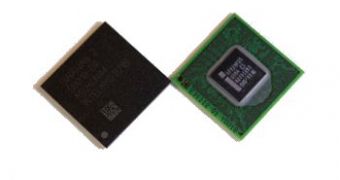It appears that Intel has finally brought forth its first Oak Trail central processing units that are meant for tablet PCs, set to perpetuate the Atom series of CPUs and paired with the SM35 Express Chipset.
The past few months have been filled with rumors and reports about what the upcoming Oak Trail Atom platform from Intel was going to be able to do.
Still, if any common ground existed, it was that the Intel chips, or chip if it debuted alone, would be the CPU giant's main weapon on the tablet front.
The Atoms so far unveiled didn't really have what it took to compete with ARM designs, especially in terms of power consumption.
Fortunately, Intel completed the Atom Z670, which is supposed to have better video playback, faster web browsing and overall better performance while also sporting a lower power draw.
The newcomer features a single core (dual-core variant will be available as well) and has a processing frequency of 1.5 GHz, as well as 512 KB of L2 cache and support for up to 2 GB of DDR2 at 800 MHz.
Meanwhile, the Intel SM35 Express Chipset will provide the necessary USB 2.0 support, High-Definition Audio and was designed free of lead and halogens.
“The new Intel Atom ‘Oak Trail’ platform, with ‘Cedar Trail’ to follow, are examples of our continued commitment to bring amazing personal and mobile experiences to netbook and tablet devices, delivering architectural enhancements for longer battery life and greater performance,” said Doug Davis, vice president and general manager of the Netbook and Tablet Group at Intel.
“We are accelerating the Intel Atom product line to now move faster than Moore’s law, bringing new products to market on three process technologies in the next 3 years.”
Of course, being a tablet-aimed processor, the Atom Z670 would be superfluous without some design wins, so the Santa Clara, California-based company was sure to mention that over 35 slates and hybrid devices powered by it have been designed or will show up soon.
Fujitsu, Viliv, Lenovo, Motion Computing and Razer are among the companies set to promote such electronics.

 14 DAY TRIAL //
14 DAY TRIAL //